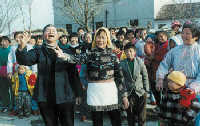 Wu Songs refer to folk songs sung in local dialect, includingshange(mountain songs),xiaodiao(small tunes), andhaozi(work songs), popular in the wholeYangtze RiverDelta. The beautifuljiangnanarea (south of Yangtze River) is the hometown of Wu Songs, while the vastTaihu Lakeis known as the art form's birthplace. It is said that during the 13th century BC, at the end of theShang Dynasty(1600-1100 BC), Emperor Zhou sent his eldest son to found a capital in today's Wuxi ofJiangsu Provinceand to help develop the area's culture using music.
Wu Songs refer to folk songs sung in local dialect, includingshange(mountain songs),xiaodiao(small tunes), andhaozi(work songs), popular in the wholeYangtze RiverDelta. The beautifuljiangnanarea (south of Yangtze River) is the hometown of Wu Songs, while the vastTaihu Lakeis known as the art form's birthplace. It is said that during the 13th century BC, at the end of theShang Dynasty(1600-1100 BC), Emperor Zhou sent his eldest son to found a capital in today's Wuxi ofJiangsu Provinceand to help develop the area's culture using music.
Amazingly, the tradition of singing Wu Songs has lasted for 3,000 years.
According to its musical form, Wu Songs fall into two types: short and long songs. The short include mountain songs, short tunes, and working songs. The gentle local dialect and sweet tunes allow listeners to relish the songs. Each has a touch of the particular region’s clear and delicate flavor.
In the past, mountain songs prevailed in almost every village of Jiangsu andZhejiang provinces, and local farmers used to refer to them as a good way to get over fatigue and irritations. Of all the mountain songs, those in Jiashan County of Zhejiang Province are the most popular. Even today, people can still sing a few of them.
County of Zhejiang Province are the most popular. Even today, people can still sing a few of them.
There is an interesting legend concerning the Jiashan mountain songs.
A long time ago, a young man named Zhang Liang, who was good at mountain songs, came to Jiashan.
As a lover and good singer of mountain songs, Zhang Liang's singing spread wherever he went. A local girl, fascinated by his voice, fell in love with him, and soon, they got married. Poverty stricken, Zhang Liang, with his son, bid farewell to his wife and daughter to purchase waxberries with view to sell them at a higher price.
While rowing the boat, Zhang Liang kept singing all the way, and his smart son, having nothing to do, carved the lyrics all over the boat. After nine years and nine days, Zhang Liang returned home. However, everything had changed in his hometown. Both his wife and daughter failed to recognize him. He sang a love song to a local girl, who turned out to be his daughter. Embarrassed and ashamed, he burned the boat that was carved with lyrics. This is the reason it is said that local farmers of today can't sing a complete mountain song.
